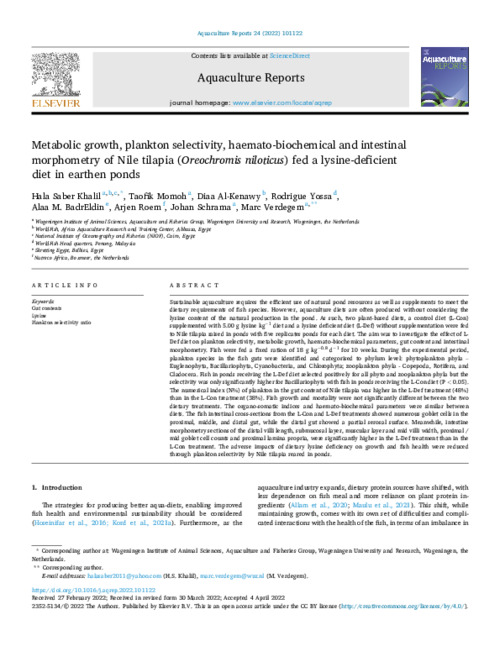Metabolic growth, plankton selectivity, haemato-biochemical and intestinal morphometry of Nile tilapia (Oreochromis niloticus) fed a lysine-deficient diet in earthen ponds

Sustainable aquaculture requires the efficient use of natural pond resources as well as supplements to meet the dietary requirements of fish species. However, aquaculture diets are often produced without considering the lysine content of the natural production in the pond. As such, two plant-based diets, a control diet (L-Con) supplemented with 5.00 g lysine kg−1 diet and a lysine deficient diet (L-Def) without supplementation were fed to Nile tilapia raised in ponds with five replicates ponds for each diet. The aim was to investigate the effect of L-Def diet on plankton selectivity, metabolic growth, haemato-biochemical parameters, gut content and intestinal morphometry. Fish were fed a fixed ration of 18 g kg−0.8 d−1 for 10 weeks. During the experimental period, plankton species in the fish guts were identified and categorised to phylum level: phytoplankton phyla – Euglenophyta, Bacillariophyta, Cyanobacteria, and Chlorophyta; zooplankton phyla - Copepoda, Rotifera, and Cladocera. Fish in ponds receiving the L-Def diet selected positively for all phyto and zooplankton phyla but the selectivity was only significantly higher for Bacillariophyta with fish in ponds receiving the L-Con diet (P < 0.05). The numerical index (N%) of plankton in the gut content of Nile tilapia was higher in the L-Def treatment (48%) than in the L-Con treatment (38%). Fish growth and mortality were not significantly different between the two dietary treatments. The organo-somatic indices and haemato-biochemical parameters were similar between diets. The fish intestinal cross-sections from the L-Con and L-Def treatments showed numerous goblet cells in the proximal, middle, and distal gut, while the distal gut showed a partial serosal surface. Meanwhile, intestine morphometry sections of the distal villi length, submucosal layer, muscular layer and mid villi width, proximal / mid goblet cell counts and proximal lamina propria, were significantly higher in the L-Def treatment than in the L-Con treatment. The adverse impacts of dietary lysine deficiency on growth and fish health were reduced through plankton selectivity by Nile tilapia reared in ponds.
Permalink
Date Available
Type
Publisher
Countries
ISSN
2352-5134
Copyright
CC-BY-4.0
Research Themes
Topics
Language